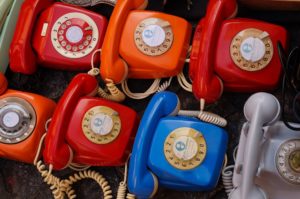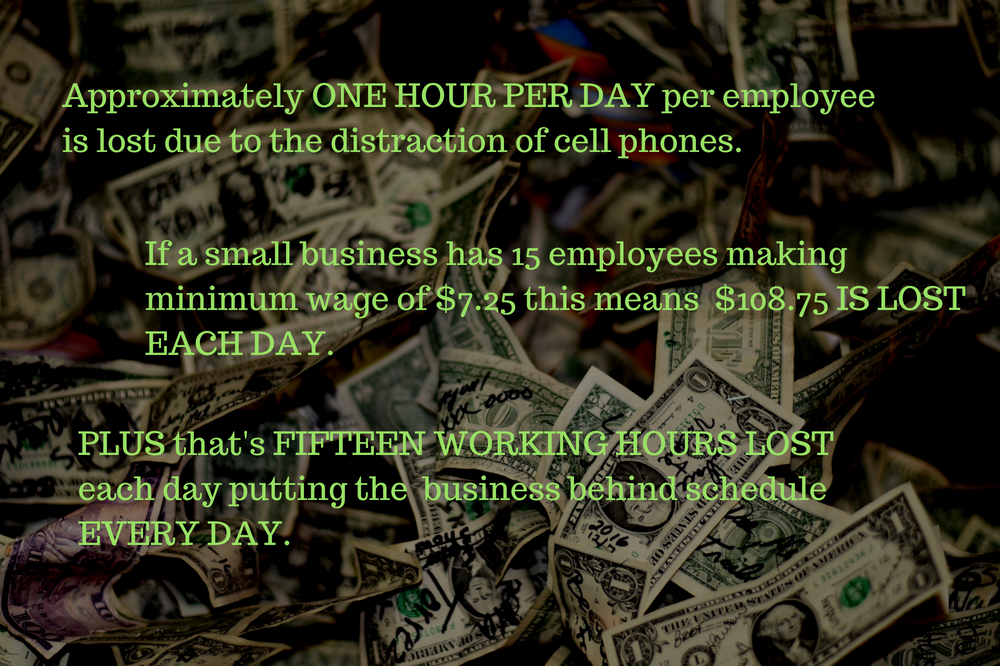In January of 2018, ninety-five percent of adults in the United States own a cell phone, while seventy-seven percent of adults use a smartphone(R).
In 2018, according to Forbes, mobile ad spending will encompass seventy-five percent of all digital ads purchased(R).
So, there’s no debating that mobile devices, smartphones especially, are an essential part of our daily lives.
The Cell Phone Distraction

However, as business owners, smartphones are a double-edged sword. Personally, as well as professionally, smartphones pose a serious distraction to our working lives (R). According to Flurry, people spend up to five hours of their day attached to mobile devices.
For personal productivity, that’s terrible, but from the standpoint of having a captive mobile audience, it’s genius. Unfortunately, the inability to harness the power of mobile advertising properly is also crushing the only solid positive perspective an entrepreneur has in this mobilized world.
People spend up to five hours of their day attached to mobile devices.
To help entrepreneurs to feed the mobile bear, without getting swallowed themselves, here are the reasons your smartphone is killing your business; both personally and professionally.
How Smartphones Impact Our Lives- Both Personally and Professionally
There’s no true escape from the unfortunate fact that smartphones play a large, negative role in our everyday lives. For many people, smartphones are the ones that essentially control us. From the moment most people wake up, until the moment they go to bed, they’re eyes are glued to their smartphones.
The Effects of Smartphones on Our Personal Lives

Distractions are everywhere, but with your smartphone, they become even more prevalent. Between glancing to see if anything has changed in your digital world, to answer every email, tweet, text, Facebook notification, not to mention phone calls, that five hours per day really adds up quick.

Before cell phones, the workday was less disrupted by personal calls and there were definitely no texts coming in on these rotary bad boys.
There was a time, not too long ago, when people went to work and if there wasn’t a call on the business line or an emergency, no one heard from you all day. Going to work meant you were going dark, socially.
Not even your significant other was going to reach out to you unless there was something dire that you needed to know and even then, they would call your work line. Instantaneous, personal communication lived only in the imagination brought forth by sci-movies.
However, now, the busier you are, the more notifications you receive, directly to your person…and people seek out those distractions. This is a growing problem, considering people who need to be paying attention to their real-life assets, are being sucked into a digital rabbit hole; every twelve minutes, according to the New York Post (R).
Therefore, when trying to run your business or focus on anything the real world has to offer, the average person is ripped out of their conscious thought, to check their phone, eighty times per day.
We are distracted at work by our phones EIGHTY TIMES PER DAY.
However, posing as a distraction from the things that really matter in life don’t even start to cover the damage cell phones cause.
Cell Phones and Sleep Deprivation
Looking at your phone at night can disrupt your sleep, which eventually can disrupt your entire life.
According to Business Insider (R), the blue light that allows us to see our phone regardless of the brightness outside is confusing our bodies. This is why many wear blue light blocking glasses or use apps to block blue light on their phones.
While this blue light isn’t physically hurting us, in the form of UV rays, or carcinogenic output, the blue light is causing our body to mistake nighttime for daytime.
The blue light that allows us to see our phone regardless of the brightness outside is…causing our body to mistake nighttime for daytime. – Business Insider
While we may know that it’s nighttime, our body works separately from our mind, in some respects. When our body believes that it’s daytime, it doesn’t produce melatonin, which is the hormone that tells our body it’s time to sleep.
This results in our bodies thinking it’s nap time, instead of sleep time, causing us to sleep for only a few hours, before waking up. Afterward, we are unable to go back to sleep. Therefore, we are tired, which makes us far less productive and could eventually lead to depression (R).
People sometimes take supplements like melatonin to help with their sleep or to deal with jet lag.
Cell Phones and Addiction
People tend to let their phones dictate what they do when they do it, and how they do it. We are addicted to our phones, as a society.
In a test for cell phone addiction (R), health journalist, Catherine Price says: “The only way to score below a 5 (non-addiction) on this test is to not have a smartphone.”
However, it isn’t all our fault. Our phones have become a vital part of our lives. Our alarm wakes us up in the morning, from our phone. The respective artificial intelligence on our phone tells us our schedule, the weather, how our favorite sports team did in the game last night, and virtually any other information we’d like to know. Nevertheless, the reliance we have on our phones only makes the habit harder to break.
Now, the answer isn’t to stop using our phones.
Instead, we need to get to a point where we are in control of our phones, instead of the other way around.
Effects of Smartphones on Our Professional Lives
Time is money.
That is a popular saying, but it couldn’t be truer when discussing the professional pitfalls of cellular innovation.
Cell phones are a beast of burden to businesses; a plague that zaps creativity and manpower from every company. This plague affects everyone from the intern to the CEO and it’s only getting worse.
As Mike Elgan (R) from Computerworld wrote in his article: “As a thought experiment, imagine that an employee who used to pay attention to your business eight hours each day now pays attention only seven hours a day because he or she is now focusing on Facebook during that last hour. You’re paying the employee the same but getting less employee attention for it.”
Taking this thought a little farther, a small business is defined by the SBA (R) as a business with less than 500 employees.
Say, a business has 15 employees and they make minimum wage, yourself included, for the sake of this argument. If each of you loses one hour per day at $7.25 per hour, the businesses giving away $108.75 per day.
Plus, that’s fifteen working hours per day that nothing is getting done, which is putting the business fifteen hours behind schedule, every day. For a small business using delegation, that’s a lot of time and money being wasted.

However, as a business owner, this is something that is hard to control and even harder to crack down on, because you’re guilty of it too.
While your interactions with your phone are likely more relevant to the business, what’s being done is irrelevant.
There is still that one hour (on average) per day that’s being consumed sporadically throughout the day, breaking your concentration.
How to Find a Healthy Cellular Consumption Balance
Breaking the cycle of cellular consumption can help a business owner; both personally and professionally. While you can’t control the actions of others, you can change your own actions and use the majority’s cellular weakness to your advantage.
Finding a Balance Personally
People are so quick to dismiss the idea that unplugging themselves from their smartphone is going to better their perspective and sharpen their focus.
However, a study in a recent Health Communication Journal (R) suggests that in as little as a week, adolescents responded positively to less smartphone interaction. Within a week, the teenagers studied were sleeping better and had better concentration. This study is perceived to have a similar effect on adults.
So, to help adults start their unplugging adventure, here the most effective ways to get back to basics and put distance between you and your smartphone:
4 Ways to Put a Healthy Distance Between You and Your Smartphone
1. Use Airplane Mode– Placing your phone in airplane mode will cut off phone calls, texts, and other notifications, resulting in fewer distractions.

Studies show decreasing cell phone usage increases happiness.
2. Uninstall Social Media on Smartphone– By taking social media off a smartphone, a person will drastically decrease the number of notifications they receive. That way, the person isn’t always being drawn out of their train of thought for superfluous reasons. However, they will still receive important correspondence.
3. Block Notifications on Smartphone– Blocking all the notifications on a phone allows the person to keep their apps and social media on their phones, without the distractions that come with it.
4. Use Apps to Track Time: When people use applications such as Rescue Time, it helps them to see exactly how much time they are producing during the day and how much time is spent playing around. This could be a real eye-opener, especially for a lot of business owners.
You may think you’re optimizing your time, but apps like this will help you quantifiably find more time, by showing you which habits you need to break.
Finding a Balance Professionally
While it’s in the business owners best interest to shift their focus away from their smartphones, that doesn’t mean they should completely disconnect themselves. Sure, personal use of smartphones is killing your business, but if you use the information about smartphones to your advantage, the rewards are sure to be fruitful.
Optimizing Your Business For Mobile Use
A statistic published by Front Burner Marketing states that over 50% of mobile consumers are either researching or ready to purchase when they call a business from their mobile device (R).
However, many business owners let their mobile websites and business social media fall by the wayside.
When mobile should be what business owners are primarily focusing on.
Many business owners let their mobile websites and business social media fall by the wayside…when mobile should be what business owners are primarily focusing on.
Fortunately, Google Chrome allows businesses to preview what the mobile site will look like before publishing it online.
This is essential for your business, as mobile is looking like the marketing strategy of the future. So, be one of the elite and optimize your business to look spectacular on a smartphone.
Conclusion
In summation, cellular innovation has gotten to a crucial point. While smartphones haven’t come at anyone with a knife, they are certainly affecting you and possibly killing your business slowly…
That is unless you know how to counteract the effects so that they work to your advantage.
Resources:
Mobile Phone Fact Sheet: PEW Research Center
How Smartphones Makes People Unproductive: Computer World
Study on How Many Times a Day Americans Check Their Cell Phones: New York Post
How Smartphones Affect Your Brain and Body: Business Insider
The Complex Relationship Between Sleep, Depression and Anxiety: The National Sleep Foundation
Cell Phone Addiction: Catherine Price
Small Business Size Standards: SBA
Study on Adolescents’ Phone Usage and Sleep: Health and Communication Journal
Find Work-Life Balance with This App: RescueTime
Mobile Optimization Stats: Front Burner Marketing



